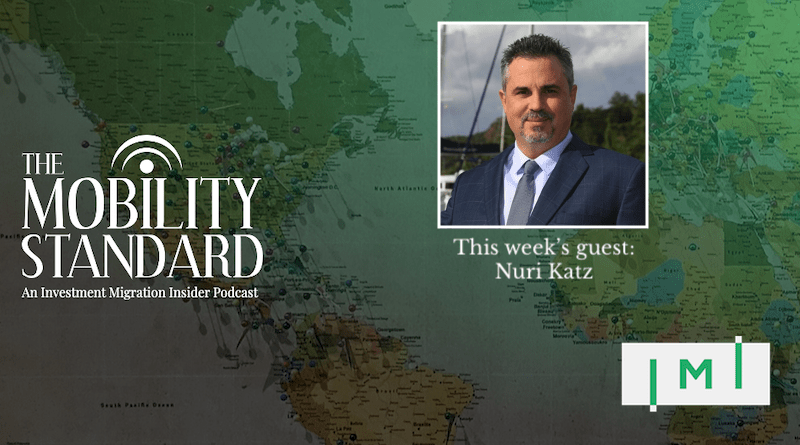“It’s a Jungle Out There”: Nuri Katz on the Mobility Standard
Our guest on the Mobility Standard this week was Nuri Katz, founder of Apex Capital Partners. We spoke to him about a range of current events, including Vanuatu’s possible suspension from the EU visa-waiver scheme, Montenegro’s last-minute CBI extension, and the industry’s apparent failure to effectively lobby the European Commission.
Timestamps:
- 02:15 – Introduction to Nuri Katz and his backstory.
- 06:00 – Why the regulatory situation in investment migration today is reminiscent of that of Canada’s immigration market in the late ’90s.
- 17:04 – What are Nuri’s main business concerns at the moment, and what’s keeping him up at night?
- 22:53 – The three main criticism against CBI, with a focus on the one that has merits.
- 26:31 – As Europe threatens to revoke Schengen access for Vanuatu, what are the implications for the Carib 5?
- 37:14 – Why industry efforts to lobby Brussels appear to have been ineffective.
- 51:19 – Montenegro’s CIP extended in the nick of time – What happened in those final days?
CBI Due Diligence is “The Best Due Diligence Known to Man”
Discussing the merits of the European Commission’s claim that a lack of due diligence in CBI gives rise to security threats, Katz dismisses the notion.
“The due diligence on candidates for citizenship in CBI countries is the best due diligence known to man,” says Katz. “It’s certainly much better due diligence than the US does on its EB-5 applicants or the one the Canadian government does on its own its investor immigration clients, not to mention the UK.”
The chief problem, he indicates, is related not to the vetting procedures but to fly-by-night companies.
“It’s a jungle out there. I’ve seen so many companies that, because there was no regulation, were able to open up for a few years make a bunch of money, get in trouble, and then disappear. I’ve seen that over and over and over and, so, that for me is the weak link of this industry.”
He also believes European regulators either don’t understand or don’t want to understand, the degree to which CBI jurisdictions engage in screening of applicants.
“I think the people in the European Commission who are looking at this industry are taking a very superficial look. They’re thinking ‘oh, money is being exchanged for citizenship and that means that it’s dangerous’. In all honesty, yeah, money is being exchanged for citizenship. But before the exchange happens the money goes through the most serious type of due diligence checks.”
Other elements in Europe, he intimates, are ideologically opposed to the very notion of CBI because they don’t think wealth should buy any type of advantage.
“But everything is being sold for money, including cars and houses. The home that I live in was sold for money to me. So, yes, rich people have – fortunately or unfortunately – access to better hotels and better cars and better a lot of things.”
Takes his part of the blame for industry failure to successfully lobby Brussels
Katz expresses a willingness to personally shoulder some of the blame for why lobbying efforts on behalf of investment migration have been unsuccessful with Brussels.
“I take the blame myself. I haven’t really participated in going to Brussels and lobbying Brussels. We should have some kind of more effective lobbying group. A bunch of groups have been formed but they’re not effective, clearly.”
Katz adds that the industry should have pooled its money and hired professionals to advocate its cause with the EU.
“It should be a coordinated effort with a real budget and a real system for lobbying. We’re not lobbyists; we should be hiring lobbyists.”
Reacting to Montengro’s last-minute extension of its CBI program, Katz hinted the perceived urgency had been good for business.
“It actually all worked out well for us because, as we know through our experience in Quebec and in Saint Kitts and in lots of different countries, the threat of a program ending leads to everybody who’s sitting on the sidelines to come to decisions faster. So, it was very good for our firm and, I’m assuming, good for the other firms as well.”
Christian Henrik Nesheim is the founder and editor of Investment Migration Insider, the #1 magazine – online or offline – for residency and citizenship by investment. He is an internationally recognized expert, speaker, documentary producer, and writer on the subject of investment migration, whose work is cited in the Economist, Bloomberg, Fortune, Forbes, Newsweek, and Business Insider. Norwegian by birth, Christian has spent the last 16 years in the United States, China, Spain, and Portugal.



